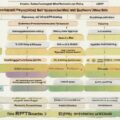Are you looking to inject some energy and enthusiasm into your life? Understanding the concept of zest may be the key. In this article, we’ll explore the definition of zest, delve into its significance, and provide examples of zest in action. By the end, you’ll see just how vital this quality can be for a fulfilling and vibrant life.
Understanding Zest: A Comprehensive Definition
Zest is not just a flavor or a soap; it’s a psychological construct that represents one’s approach to life with energy, enthusiasm, and excitement. It’s the dynamic force that motivates individuals to embrace experiences wholeheartedly and engage with life’s challenges and opportunities with a positive spirit. Zest is an integral component of the character strength spectrum and is closely associated with vitality and vigor.
The Importance of Zest in Everyday Life
Why is zest so important? For starters, zestful individuals tend to lead happier, more satisfying lives. They are often more successful in their personal and professional endeavors, as their enthusiasm is contagious and inspires others. Zest drives people to go beyond the mundane, to seek out new experiences, and to persist in the face of adversity. In essence, zest is a catalyst for resilience and well-being.
Examples of Zest in Various Aspects of Life
Zest can be seen in a variety of life situations. For example, a zestful person might approach a new job or project with vigor, bringing fresh ideas and a can-do attitude. In personal relationships, someone with zest may be the one to plan adventures or encourage others to try new things. Even in challenging times, zest inspires individuals to look for the silver lining and maintain a hopeful perspective.
How to Cultivate Zest in Your Life
Fortunately, zest is not an innate trait limited to a select few; it can be cultivated and nurtured. Engaging in activities that you’re passionate about, practicing gratitude, seeking out positive relationships, and maintaining physical health are all ways to build zest. By consciously incorporating these practices into your life, you can enhance your level of zest and enjoy its many benefits.
Zest as a Key to Personal Development
Zest plays a crucial role in personal development. It encourages continual growth and learning, pushing individuals to expand their horizons and step out of their comfort zones. With zest, personal setbacks become opportunities for growth, and life becomes an exciting journey of discovery.
FAQ on Zest
- What is the difference between zest and happiness?
Zest is a dynamic state of enthusiasm and energy, while happiness is more of an overall sense of contentment and well-being. Zest often contributes to happiness but is distinct in its proactive and engaging nature. - Can zest be learned or increased?
Yes, zest can be developed through mindful practices such as engaging in enjoyable activities, fostering positive relationships, and maintaining good physical health. - Is zest important for success?
Zest can significantly enhance one’s chances of success by fueling motivation, fostering resilience, and encouraging a proactive approach to challenges and opportunities. - How does zest impact relationships?
Zest can positively impact relationships by bringing energy and enthusiasm into interactions, which can be uplifting and inspiring for all parties involved. - Are there any risks to being too zestful?
While zest is generally positive, excessive zest without balance can lead to burnout or neglect of other important areas of life. It’s important to cultivate zest mindfully and with self-awareness.









